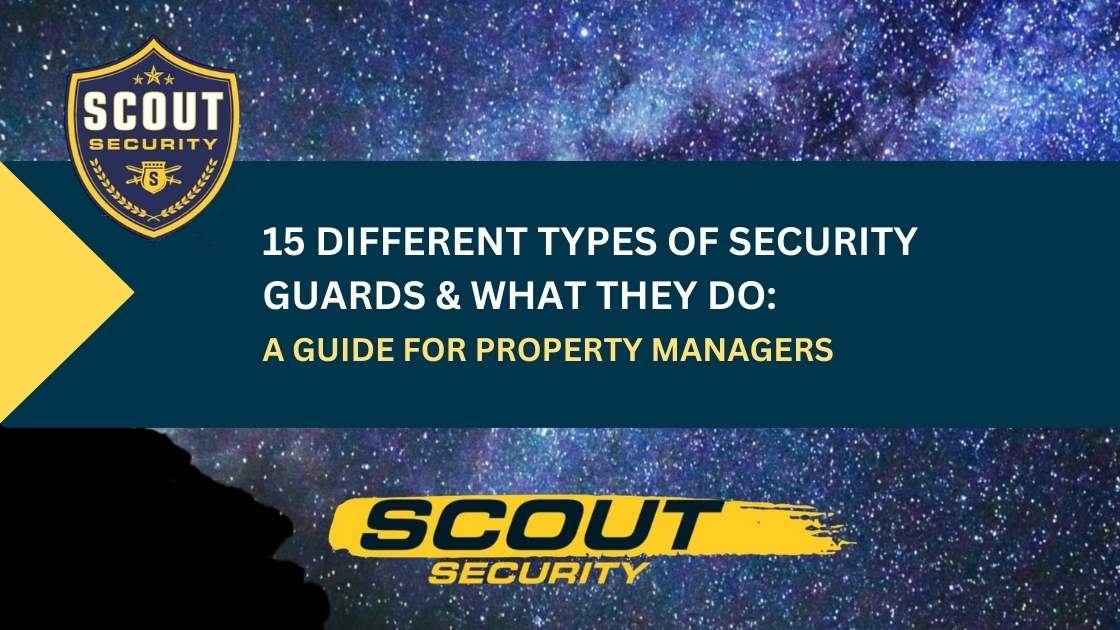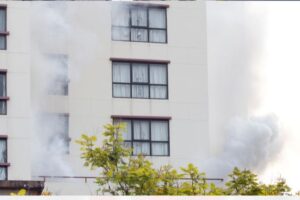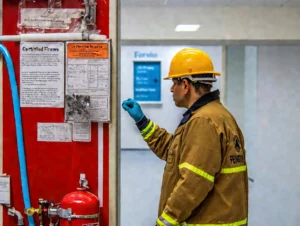There are many types of security guards that business owners and property managers can hire to meet their demanding security requirements, whether it is for enhancing security in business centers, residential areas, or high-risk industrial and construction sites.
You must understand the differences between your options including their roles to ensure that you are hiring security personnel whose skills match your specific needs. From armed to unarmed guards and static to mobile security guards for different settings, this article will reveal the diversity within the security sector.
Here are 15 different types of security officers and guards along with their roles and ideal applications.
If you are looking for an all-in-one security partner for your business, Scout Security offers robust security solutions that include dedicated security guards, mobile patrollers, hotel guards, video surveillance officers, construction site security, manufacturing security, and others. Call us now!
3 General Types of Security Guard Forces Based on Employment Type
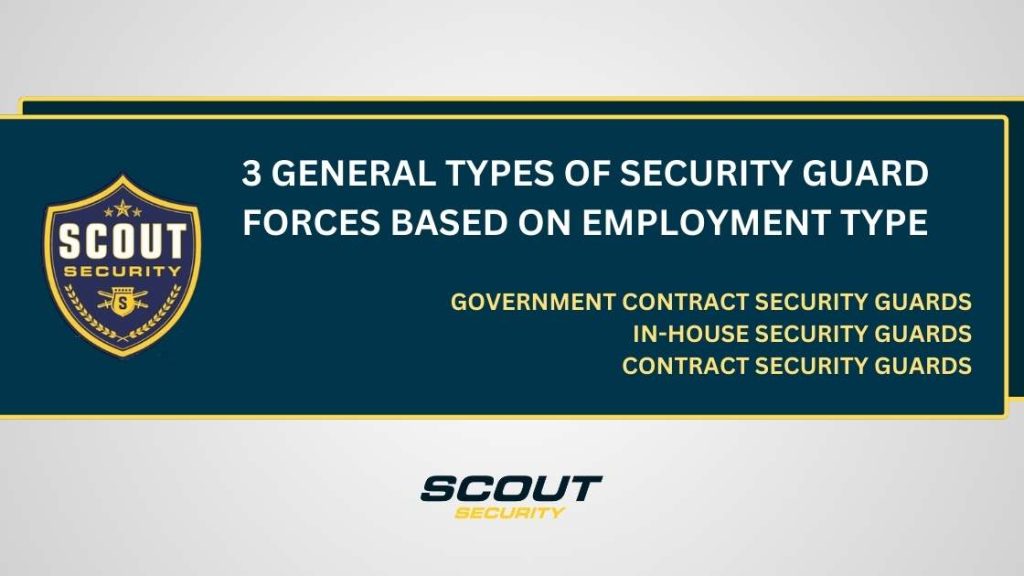
#1. Government Contract Security Guards
These are elite professionals assigned to high-risk situations to safeguard government properties, assets, and personnel. They are hired by the government through a stringent process to ensure spotless criminal records. They are usually armed and rigorously trained to handle a myriad of security scenarios with precision.
Government security guards are often tasked to secure specific facilities such as:
- Courthouses
- Military command centers
- Banking halls
- Access points
#2. In-House / Proprietary Security Guards
In-house security guards are professionals hired directly by you if you want to avoid third-party agencies. They operate under your company’s management and are directly integrated into your organizational structure. This is chosen by businesses who want a familiar presence in maintaining safety and integrity within their property.
Unlike contracted guards (which we will discuss later), in-house security guards report directly to you – their employer. This ensures consistency in securing your assets and personnel while providing tailored security measures that align with your company’s values and goals.
In-house security guards are common in:
- Banks
- Healthcare facilities
- Hotels
- Nightclubs
- Museums
- Residential areas
- Resorts
- Warehouses
- Cruise ships
Also Read: Proprietary Security vs Contract Security Companies: Which Suits Your Business Best?
#3. Contract Security Guards
Contract security guards, the foundation of private security services, are the most common form of security adopted by many businesses. They work for private security agencies that aim to offer security solutions tailored to your specific needs.
If you don’t want to go through the hassle of managing in-house security personnel, hiring contract security guards is your best option. Security agencies, such as Scout Security, consist of professionals who can perform detailed risk assessments to determine your specific needs and customize effective security solutions.
Private security guards are known for their versatility and can adapt to a variety of settings and requirements. Thus, aligning with your changing needs regardless of what industry you are in.
This makes them ideal options for those looking to safeguard their businesses without the hassle of direct employment.
Also Read: How to Hire a Security Guard Company: 7 Factors to Consider When Hiring Security Guards
3 Different Types of Security Guards & Officers Provided by Private Security Companies
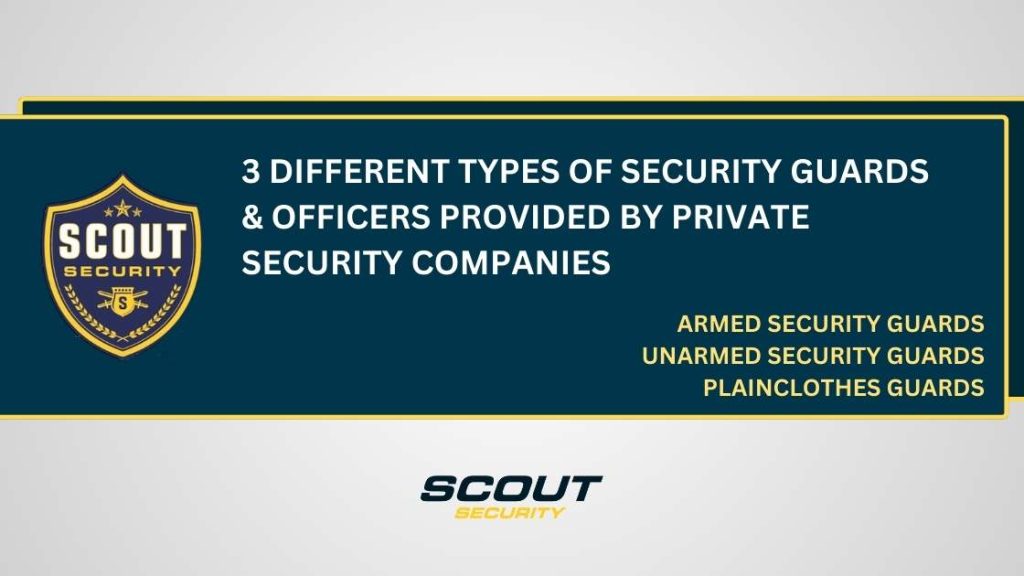
The types of guards we will list down hereafter will focus on private security guards since they are the most popular options. Below are the main categories of private security guards:
#4. Armed Security Guards
Armed security guards are your formidable line of defense in situations that require a very high level of security. They are employed for safeguarding properties that have a high chance of being targeted by violent crimes where traditional security may fall short. These include banks and jewelry stores among other facilities handling large sums of money and high-value goods or people.
Moreover, armed guards are legally certified to carry firearms and often have military or law enforcement backgrounds. Their role is more than just providing visible deterrence. They are trained to respond decisively to immediate threats where the use of force might be necessary.
Given the weight and serious implications of carrying and using lethal weapons, they also undergo rigorous training that includes state-mandated firearms certification. Thus, ensuring that they operate within the bounds of the law.
NOTE: The biggest disadvantages of hiring armed guards for business owners and property managers are greater liability and higher insurance premiums.
Also Read: How to Choose Between Armed & Unarmed Security Guards: What Are Their Pros & Cons?
#5. Unarmed Security Guards
Unlike armed security guards, unarmed guards can perform a variety of responsibilities effectively even without the use of lethal weapons. These include:
- Threat identification
- Video surveillance
- Access control
- Patrolling
- Policy enforcement
- Crowd control
- Conflict de-escalation
- Emergency response
Moreover, unarmed guards serve as powerful deterrents to criminal activities despite not carrying firearms. Since they only carry non-lethal weapons such as pepper sprays, batons, and tasers, you don’t need to worry about facing liabilities involved with accidents or fatalities caused by the use of firearms. In addition, the use of less-lethal weaponry reduces injury rates to civilians and security officers.
Scout Security’s unarmed security guards consist of former military and law enforcement personnel. Thus, you can trust our guards to provide you with the high level of security you need despite not being equipped with firearms.
Also Read: Armed vs Unarmed Security Guards: How to Determine Your Security Needs
#6. Plainclothes Guards
Plainclothes guards can blend seamlessly into their surroundings to encourage people to behave naturally while being unaware of surveillance. This offers a subtler approach to security without alarming or causing discomfort to your employees or customers. They are ideal for settings where a visible security presence might be intrusive but still need a certain level of protection to safeguard your assets and ensure safety.
9 Specific Types of Security Guard Services
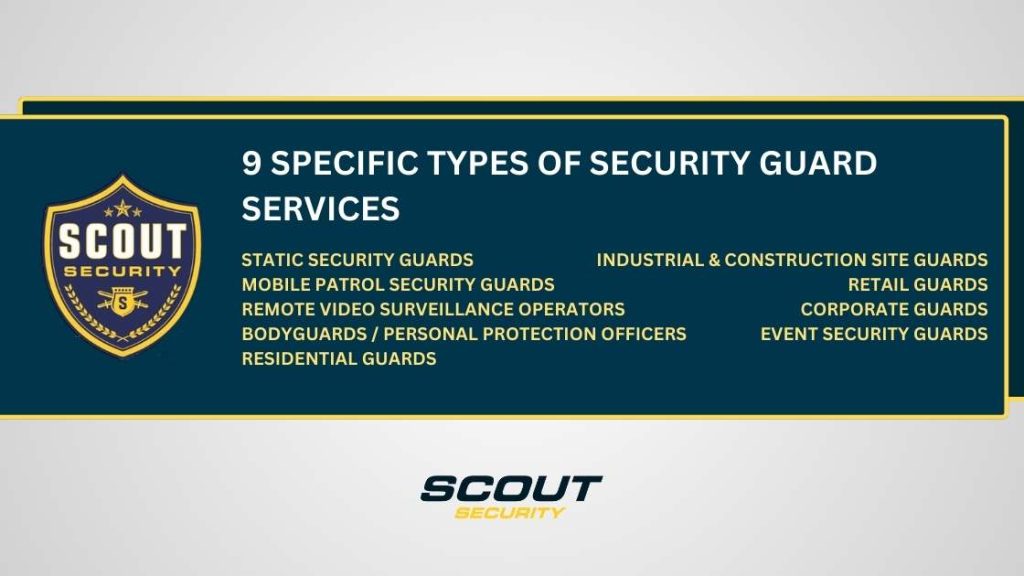
Aside from armed, unarmed, and plainclothes guards, there are also different types of security services where guards can be categorized based on their specific duties.
#7. Dedicated / Static / Stationary Security Guards
Dedicated or static security guards are common in commercial and retail establishments. They are usually stationed at entrances or exits and other strategic points. Their tasks include monitoring suspicious behavior and responding to security threats swiftly. They are best for applications that require continuous surveillance to ensure the overall safety of your business’s operations and the well-being of your customers and staff.
Ideal Applications
- Supermarkets
- Retail stores
- Hospitals
- Construction sites
- Parking lots
- Office Buildings
- Banks
- Hotels
- Other hospitality businesses
Also Read: When Should You Hire Short-Term or Temporary Security Guards?
#8. Mobile Patrol Security Guards
Mobile patrol guards use vehicles to efficiently patrol and secure large areas in locations that require extensive surveillance. These guards conduct their patrols either through scheduled or random intervals through strategically planned patrol routes to deter law violators and stop ongoing security breaches.
Moreover, mobile patrollers can enforce vehicle traffic and parking policies, conduct thorough checks for suspicious activities or threats, and identify suspicious vehicles to provide a comprehensive security presence. They also use advanced technology for logging patrols to ensure accountability and assure you that they are doing their job.
Ideal Applications
- Parking lots
- Campuses
- Construction sites
- Warehouses
- Industrial sites
- Malls
- Airport
- Schools
- Hotels
- Shopping center
Also Read: Security Guards vs. Police Officers: Key Differences & Similarities
#9. Remote Video Surveillance Operators
Video surveillance operators are trained in surveillance tactics and using security equipment which allows them to effectively spot unusual activities or security breaches by analyzing live and recorded CCTV footage.
They are best for environments considered to have lower physical risks but require sharp observation skills to promptly identify significant incidents that could impact your business around the clock.
#10. Bodyguards / Personal Protection Officers / Executive Guards
These highly trained and well-armed guards ensure the safety of high-net-worth individuals (HNWIs), celebrities, dignitaries, politicians, and other VIPs. They identify and avoid potential dangers to ensure their client’s safety in various settings such as crowded events and private travels.
#11. Residential Guards
Residential guards ensure safety in communities, apartment complexes, and other residential areas by performing regular patrols, conducting night watch operations, and controlling access. They help mitigate security risks like parking lot thefts, vehicular vandalism, and break-ins to provide peace of mind to residents and homeowners.
Also Read: 12 Top Duties & Responsibilities of a Security Guard
#12. Industrial & Construction Site Guards
These security professionals protect industrial facilities, warehouses, and construction sites that contain high-value products, materials, and equipment. These assets make these properties vulnerable to thefts and vandalism which is why 24/7 surveillance is crucial to reduce costly losses, damages, and delays.
Their duties include:
- Controlling access
- Monitoring your premises
- Securing tools and equipment
- Ensuring after-hours security
#13. Retail Guards
Retail security guards prevent unlawful activities by watching out for any suspicious behavior, monitoring security cameras, and patrolling areas with expensive goods.
Aside from preventing employee theft, one of their key duties is acting as loss prevention specialists, especially in high-risk settings dealing with premium merchandise such as luxury stores. They also coordinate with law enforcement to handle security incidents. Thus, providing a safer and secure shopping experience for your customers while protecting your assets.
#14. Corporate Guards
Corporate security guards specialize in maintaining the safety and security of office environments and corporate facilities. Aside from access control, they also:
- Serve as on-site liaisons for emergency services
- Assist your guests and employees entering and leaving your premises
- Monitor security equipment including cameras and alarms
Also Read: How Can Uniformed Security Guards Deter Crime in Your Business?
#15. Event Security Guards
Lastly, event guards are trained to manage large gatherings (e.g. concerts, sports competitions, conferences, celebrations, etc.) to safeguard the safety and enjoyment of the attendees by:
- Controlling venue access
- Preventing the introduction of prohibited items
- Providing vehicle and pedestrian traffic control
- Ensuring crowd safety
- Maintaining order
- Diffusing tensions & handling disturbances, especially in alcohol-involved situations
Also Read:
- 15 Top Qualities of a Good Security Guard: Skills to Look For
- The Role of Security Guards in Emergency Response
- How Security Guards Handle Conflicts & De-escalate Violent Situations
- 10 Benefits of Hiring a Security Guard to Protect Your Business
FAQs
In general, there are three types of security guards: government guards, in-house guards, and private security guards who can be armed or unarmed. These types can be categorized further based on the guard’s specific duties such as dedicated guards, mobile patrollers, video surveillance operators, industrial guards, and others.
The commander or chief has the highest position in a security organization. This individual manages all security personnel and is a strategic leader who develops security protocols that guide the actions of all the subordinates.
The two major types of security patrols are foot patrols and mobile patrols. Other types include observation post patrols, remote patrols, artificial intelligence patrols, and active and random patrols.
Conclusion
Understanding the different types of security guards is crucial, especially for business owners and property managers aiming to enhance safety and security on their properties. Selecting the right type of security guard, whether through direct hire or via reputable agencies like Scout Security, is crucial in addressing the unique challenges and requirements of your business.
We offer a wide range of private security guard services in the Denver Metro and Colorado Springs areas. From static security guards and mobile patrollers to video surveillance officers and industrial guards, our fully certified personnel are always ready to respond to your security needs. Hire us now!

